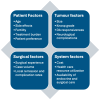A Narrative Review of Surgery for Prolactinomas: Considerations and Controversies
- PMID: 40004619
- PMCID: PMC11856391
- DOI: 10.3390/jcm14041089
A Narrative Review of Surgery for Prolactinomas: Considerations and Controversies
Abstract
For several decades, dopamine agonist therapy has been the mainstay of treatment for prolactinomas, with surgery generally considered a second line for cases failing medical therapy due to intolerance or resistance. There is increasing recognition of the burden of long-term DA therapy; many patients experience debilitating side effects, and emerging evidence demonstrates that the prevalence of impulse control disorders has been vastly underreported. Long-term DA therapy is associated with significant costs to patients and healthcare systems, which is projected to exceed that of surgery in many circumstances. Recent advancements in surgical approaches, including endoscopic transsphenoidal surgery, have led to improved surgical outcomes (82-100% remission rates; serious complication rates < 2%), prompting a reappraisal of the role of surgery for prolactinoma. Favourable surgical outcomes have been observed in both remission and complication rates for microprolactinomas and well-circumscribed macroprolactinomas, leading to consideration of surgery as an earlier, or first-line, option in the treatment paradigm. Potential advantages of surgical management should be weighed against institutional case volume and expertise, the risk of perioperative complications, and the need for adjuvant medical therapy post-operatively. Ultimately, patients and care-providers should engage in shared decision-making following informed discussion about the risks and benefits of both medical and surgical approaches.
Keywords: dopamine agonist; pituitary adenoma; prolactinoma; transsphenoidal surgery.
Conflict of interest statement
The authors declare no conflicts of interest.
Figures


Similar articles
-
Outcomes of Transsphenoidal Microsurgery for Prolactinomas - A Contemporary Series of 162 Cases.Exp Clin Endocrinol Diabetes. 2021 Mar;129(3):163-171. doi: 10.1055/a-1247-4908. Epub 2021 Jan 18. Exp Clin Endocrinol Diabetes. 2021. PMID: 33461233
-
Treatment of Prolactinoma.Medicina (Kaunas). 2022 Aug 13;58(8):1095. doi: 10.3390/medicina58081095. Medicina (Kaunas). 2022. PMID: 36013562 Free PMC article. Review.
-
Dopamine agonist therapy for prolactinomas: do we need to rethink the place of surgery in prolactinoma management?Endocr Oncol. 2022 Apr 21;2(1):R31-R50. doi: 10.1530/EO-21-0038. eCollection 2022 Jan. Endocr Oncol. 2022. PMID: 37435462 Free PMC article. Review.
-
Efficacy and Safety of Endoscopic Transsphenoidal Resection for Prolactinoma: A Retrospective Multicenter Case-series.Arch Med Res. 2023 Dec;54(8):102919. doi: 10.1016/j.arcmed.2023.102919. Epub 2023 Nov 30. Arch Med Res. 2023. PMID: 38040527
-
Surgical management considerations in cystic prolactinomas-a single center case series.Endocrine. 2020 Jan;67(1):58-66. doi: 10.1007/s12020-019-02076-8. Epub 2019 Nov 26. Endocrine. 2020. PMID: 31773633
References
Publication types
LinkOut - more resources
Full Text Sources

